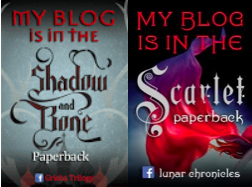Hello and thank you for stopping by! Song for a Whale by Lynne Kelly comes out February 5th and today I’m on the blog tour with TWO exciting items… an author interview and a giveaway! This was the second book I read this year and it contributed to a bit of a middle grade reading frenzy for me. I just loved it so much! My review will be up soon. For now, here’s more about the book:
Twelve-year-old Iris has never let her deafness slow her down. A whiz at fixing electronics, she’s always felt at home in the world of wires and vacuum tubes.
School, on the other hand, isn’t quite as simple. Between her frustrating teacher Ms. Conn and her overly helpful classmate Nina, Iris can’t seem to catch a break.
But during science class, Iris learns about Blue 55—the loneliest whale in the world. Saddened by the animal’s inability to speak to other whales, Iris uses her tech skills to come up with a plan communicate with Blue 55.
One small problem: the whale is swimming off the coast of Alaska, nearly 3,000 miles from her Texas home. But, nothing stops Iris, and with her Deaf grandmother by her side, she sets out on a road trip to meet the whale and make sure he’s finally heard.
Goodreads * Amazon * Indiebound
Author Interview:
I sent off six questions to Lynne Kelly and she graciously answered them. Read on to learn more about what went in to Song for a Whale.
- Welcome to YA Bibliophile! I’m happy to have you here. I so enjoyed reading Song for a Whale. I believe this was your sophomore novel. How did writing your second book compare to the first?
Thank you for having me! Honestly, each time I sit down to write a new book I feel like I forgot how I did it before. Chained was the first book I wrote, so it’s the book that really taught me to write. In addition to researching elephants and India, I had a lot to learn about writing. It took about three years before I had a full manuscript that was ready to send out. I’m still not a fast writer, but it was just about a year before I had a presentable draft of Song For a Whale. I’m not a plotter by nature, but I’ve found that I do need to set down some stepping stones so I don’t wander off to far and get lost. I know pretty quickly how a story is going to end, but while with Chained I didn’t know what was going to happen from one chapter to the next, in Song For a Whale I figured out some scenes here and there throughout the story, got to know my character Iris well, and then I could more efficiently work on the rest of the book to connect the parts of her journey I knew about.
- There were so many topics included in this book that I wanted to learn more about: Deaf culture, antique radio restoration, whale communication, and so much more! What kind of research went into the writing of this book? Did you have a favorite part? Where did you start?
I love finding ways to add layers to add depth to a story. The whale came first here–after I learned about the 52 hertz whale, who sings at a frequency unlike other whales, I started reading everything I could find about him. I’m fascinated with animal communication, and I’d love to know why this whale sings a song that’s only his. Our knowledge about him is limited, so to create a fictionalized version of this whale I did some research on whales in general by reading articles and books and corresponding with whale experts. I think the chapters told from the whale’s point of view ended up being my favorite to write. Though I’ve worked as a sign language interpreter for a long time, I researched Deaf poetry by watching videos of people who do it well, to get an idea for how Iris and her grandparents might play around with their language while telling stories. A deaf college student I worked with had a lifelong hobby of repairing old radios and TVs, which I thought was interesting. That’s a skill I decided to give Iris, not knowing then what an important part of the story that would be. That’s my favorite thing about writing–discovering how the different layers are going to work together.
That former student was my “electronics nerd” expert, and two Deaf women (a professor and a writer) were the authenticity readers to check for cultural and linguistic accuracy.
- I thought the chapters from the perspective of the whale, Blue 55, were really interesting. What made you want to include his perspective?
I think because learning about the whale is what sparked this story, I was already in his head and thinking about what his story is, what his life is like. Also I love thinking about the connections we have to animals and the ways our lives are similar. Because of the parallels between Iris and the whale, I wanted to have a way to sort of “check in” with him now and then to see what he was going through.
- I learned a very little bit about Deaf culture and community when I was in college. I’m sure many of your readers will be introduced through your book. Do you have any recommendations, especially for your young readers?
Yes, there are some great websites for learning sign language. I especially love ASL University (https://www.lifeprint.com/), which has free lessons and a huge sign language dictionary. ASL Nook (http://aslnook.com/) is a fun site that’s great for both kids and adults, with a Deaf family’s sign language lessons and stories.
- I wasn’t expecting the exploration of family and grief that I found in this story. Both were so carefully and beautifully done. Can you talk about that?
I knew that Iris would need an adult with her when she tries to track down this whale, since she’s going on a journey that a kid wouldn’t be able to do alone. I’d thought of Grandma as someone who’s always been a free spirit and flighty and prone to take off without telling anyone, and i think those qualities are compounded when she’s trying to pull herself out of her grief. I wanted to show her own journey through that too. Both she and Iris will always miss Grandpa and life won’t be the same without him, but they’ll get to a point where they know they’ll be okay.
What I discovered as I wrote was that Grandma retreating into her grief also shows what Iris is afraid of losing–Iris is so close to her grandmother and that’s who she most identifies with, and she feels that relationship slipping away.
- I always like to end with recommendations! Are there any books/movies/shows/podcasts/etc… you’d like to recommend to your readers?
Fellow animal lovers will enjoy the new BBC series Dynasties, which is made by the same people who did Planet Earth. Karen Rivers A Possibility of Whales is a book that explores some difficult family relationships and friendships, and a girl who’s on the lookout for whales. A favorite podcast is Stuff You Missed In History Class, which takes an in-depth look at interesting events in history that you might not know about. And writers will want to check out Jennifer Laughran’s Literaticast podcast.
Thanks again to Lynne Kelly for answering my questions and giving some great recommendations!
About the Author:
Lynne Kelly writes contemporary middle grade and young adult fiction. She was born in Galesburg, Illinois, grew up in Houston, lived in some much colder places, then found her way back to the Houston area, where she works as a sign language interpreter. For a few years she also taught special education, a good career for someone with excellent organizational and planning skills. Lacking those skills, she quit teaching in 2006 and thankfully has more time to write. But it was during those teaching years that she worked with some great kids and became interested in writing, so that all worked out.
Her debut novel, CHAINED, is out now from Macmillan/FSG. SONG FOR A WHALE is coming in February 2019 from Random House/Delacorte.
Giveaway:
Thanks to the lovely folks at Random House Children’s Books I have a copy of Song for a Whale to giveaway! Simply enter using the rafflecopter below. US only. Must be 13 or older to enter.












Danielle Hammelef
As a person who grew up without grandparents, I love finding middle grade books with grandparent/child relationships. This book is the perfect pick for my reading. Thank you for the interview!